A Marie Curie Research Fellowship is about developing new research skills by doing research projects under the supervision of highly skilled experts. People who are interested in doing a fellowship like this might want to see what one looks like in reality, particularly a fellowship in the realm of social sciences and/or educational sciences (the SOC panel for European projects). This post describes research I generated myself (working with colleagues during my recent 2-year MSCA Individual Fellowship at UCL) and shares some photos taken with other researchers during my fellowship.
My time was distributed across six work packages (WPs). Today, I described work related to WP1, Qualitative Research and WP2, Multiple Methods.
These two work packages developed my skill with various social science methodologies. I am a pragmatist in that I try to implement whatever methodology is best suited to answer my specific question. And I have so many questions!
The experts I worked with at University College London (UCL) were Professor Nick Tyler, Professor John Mitchell, and the recently promoted Dr. Inês Direto. They were amazing!
At the time I joined, UCL was ranked seventh in the world for research by QS! It was a fantastic place to develop new skills. The fellowship ended December 31, 2019, but I am pleased to say I’m still working with UCL even now, as I was appointed Visiting Professor there for a five year term in addition to having the two-year fellowship. I collaborate with Inês and John nearly every single day.
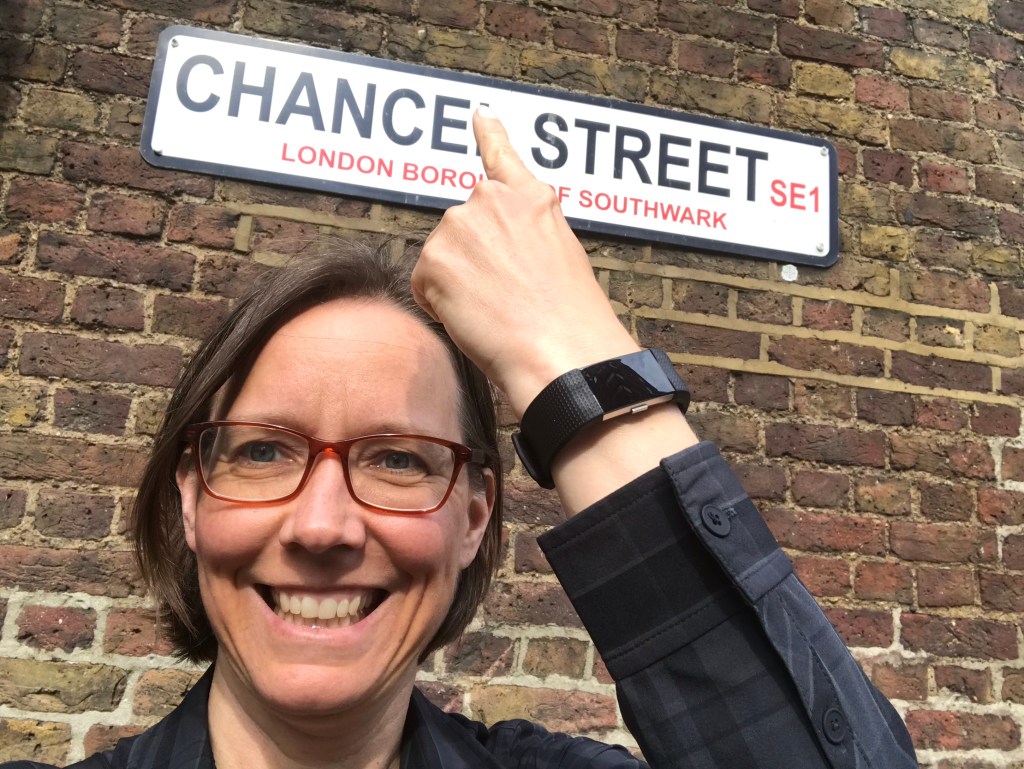
My MSCA-IF research was looking at how design projects influence the cognitive and epistemological development of undergraduates in engineering and architecture. To put it more generally, I investigate how to teach engineering as effectively as possible.
You can read an overview of the fellowship here and download my final report, with similar information, here.
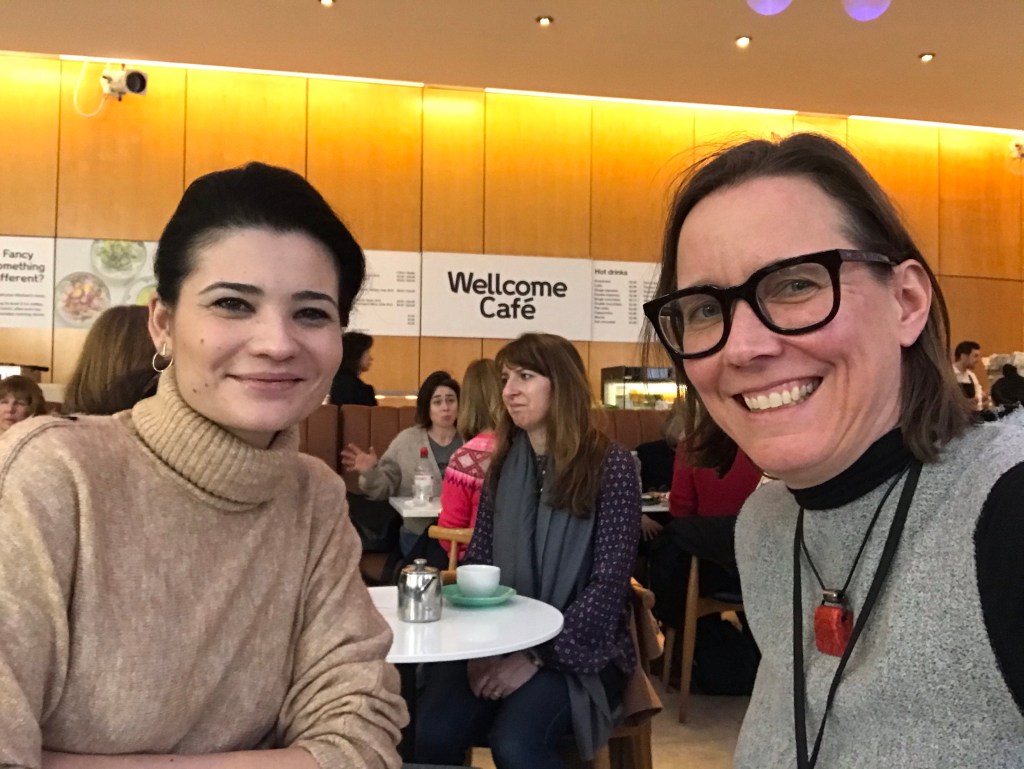
Meeting with a new Marie Curie Fellow entering UCL. 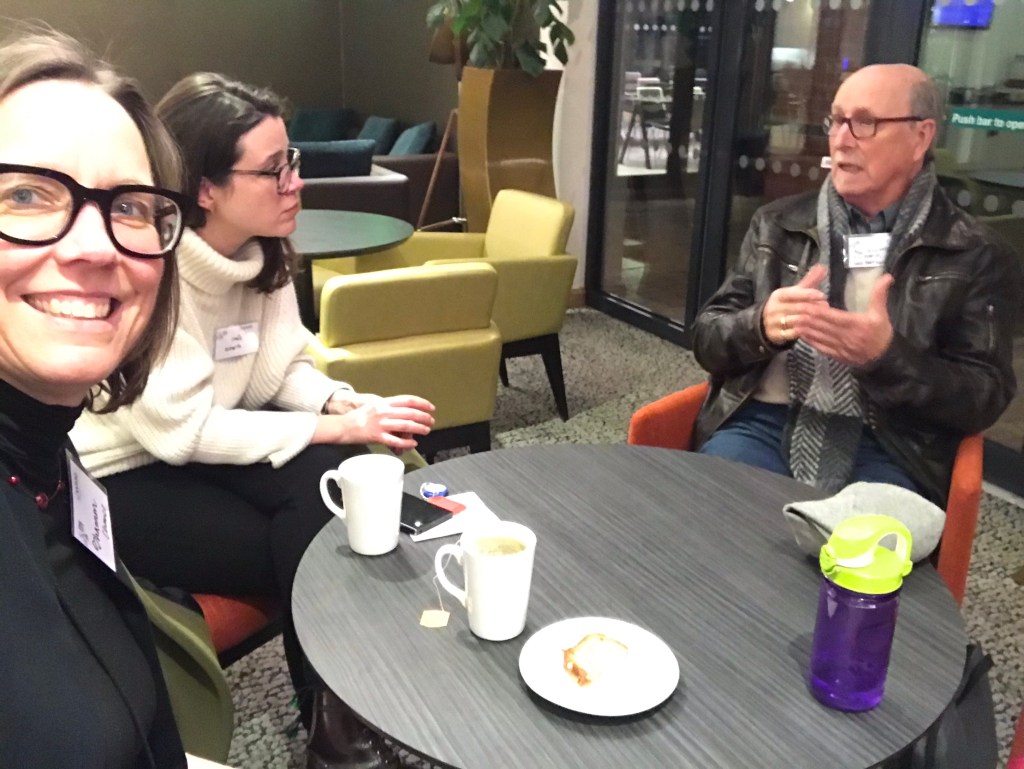
With Inês Direito and Bill Williams at EERN-UK & Ireland conference. 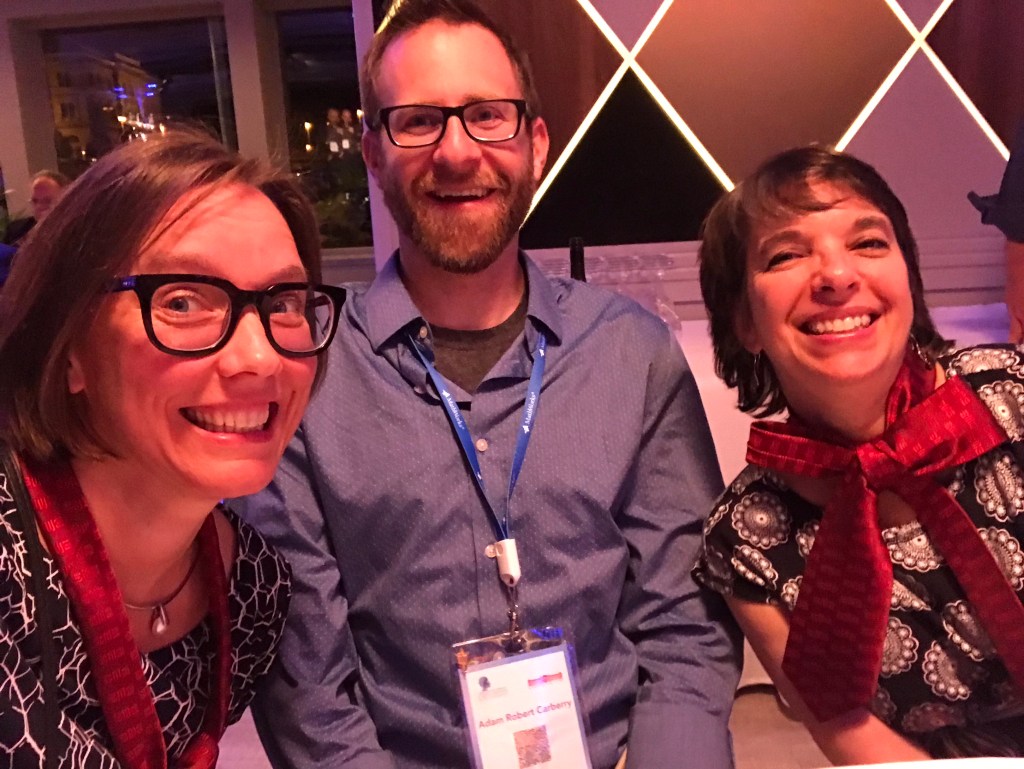
With REEN Chair Adam Carberry & JEE Editor Lisa Benson at SEFI 2019.
WP1, Qualitative Research
The intention of WP1 was to use qualitative research methods to study how engineering and architecture students learn and how they conceptualize design creation and knowledge generation. The following deliverables were listed in the fellowship application: submission of one conference paper and one journal manuscript. The list of items produced is provided below and exceeds the stated expectations. Under WP1, I delivered four conference publications and one journal publication during the fellowship period. I have an additional three conference publications and two journal manuscripts underway.
The first journal paper published under WP1 was an editorial overview of epistemological development and identity development among students published in IEEE Transactions on Education. The academic citation for it is:
CHANCE, S., Williams, B., Goldfinch, T., Adams, R. S., & Fleming, L. N. (Eds.). (August 2019). Guest Editorial Statement for the Special Issue on Using Enquiry- and Design-Based Learning to Spur Epistemological and Identity Development of Engineering Students. IEEE Transactions on Education, (62)3, 157-164. DOI 10.1109/TE.2019.2923043. (Download here).
The next set of manuscripts investigated the development of civil engineers. I conducted nine interviews with civil engineers practicing in London to explore how they think about ethics and also how they integrate global responsibility (e.g., environmental and social sustainability) into their work. This yielded two conference papers:
CHANCE, S. M., Direito, I., Lawlor, R., Cresswell-Maynard, K., Pritchard, J., Tyler, N., & Mitchell, J. (2019, July). Background and design of a qualitative study on globally responsible decision-making in civil engineering. In Proceedings of the 8th Research in Engineering Education Symposium, REES 2019-Making Connections (Vol. 8, pp. 211-220). REEN (Research in Engineering Education Network) and SASEE (South African Society for Engineering Education). (Download here or here.)
CHANCE, S. M., Direito, I., & Mitchell, J. (forthcoming). To what degree do graduate civil engineers working in London enact Global Responsibility and support UN Sustainable Development Goals? Engineering Education for Sustainable Development (EESD 2020) conference in Cork, Ireland.
The same UK-based engineering study will yield a number of journal articles. The conference paper on Sustainable Development Goals, listed above, was produced for the Engineering Education for Sustainable Development (EESD 2020) conference and is being expanded into a journal article. Moreover, the two following manuscripts have been drafted and are currently being reviewed and refined:
CHANCE, S. M., Mitchell, J., Direito, I., & Creswell-Maynard, K. (accepted for development). Limited by scope and client request: Challenges faced by early-career civil engineers enacting global responsibility in the UK workplace. European Journal of Engineering Education Special Issue: Early Career Engineers and the Development of Engineering Expertise.
CHANCE, S. M., Lawlor, R., Direito, I., Creswell-Maynard, K., & Mitchell, J. (under development). Ethical empowerment: A proposal for following past success to support sustainable behavior among civil engineers. Australasian Journal of Engineering Education. Special Issue: Ethics in Engineering Education and Practice.
Closely related to this UK engineering study is work I have done with the PhD student I have been supervising. The student’s doctoral thesis investigates how creativity is manifest in engineering design and production. The two following papers have been published and presented at conferences—they helped apply the student’s research on engineering organizations to higher education organizations—and many more journal papers are under development by the same team, to be submitted to various journals.
Empson, T., CHANCE, S. M., & Patel, S. (2019). A critical analysis of the contextual pressures sustainable development presents HE researchers and evaluators. Society for Research on Higher Education (SRHE) 2019 conference in Cardiff, UK.
Empson, T., CHANCE, S. M., & Patel, S. (2019, September). A critical analysis of ‘creativity’ in sustainable production and design. In 21st International Conference on Engineering and Product Design Education. Glasgow, UK. (Download here or here).
All the projects listed above were helping build my skills to conduct the headline project of this Work Package. For this headline project, I conducted in-depth interviews with 26 architecture and civil engineering students in the United Kingdom, Ireland, and the USA. This yielded a paper for the American Society for Engineering Education (ASEE), one of the world’s most prominent conferences on engineering education:
CHANCE, S., Mimirinis, M., Direito, I., Mitchell, J., & Tilley, E. (2019, June). How architecture and engineering students conceptualize design creation: Report of a pilot study. In American Society for Engineering Education (Vol. 126). American Society for Engineering Education (ASEE). Tampa, Florida. (Download here or here).
Two manuscripts are now under development using the data collected. These will make a major contribution to the knowledge base related to design education:
CHANCE, S. M., Miminiris, M., & Direito, I. (under development). How architecture and engineering students conceptualize design creation. Targeting the Journal of Engineering Education or similar.
CHANCE, S. M., Miminiris, M., & Direito, I. (under development). How architecture and engineering students conceptualize the generation of new knowledge. Targeting Design Studies or similar.
By attending a May 2018 workshop at the Society for Research on Higher Education (SRHE), I discovered phenomenography would be the optimal methodology for studying the issue defined in my MSCA grant application. As a result, UCL brought in the teacher of the SRHE workshop, Dr. Mike Miminiris, and employed him as a consultant to help me and my colleagues learn this highly structured research methodology. Dr. Miminiris provided a seminar for UCL staff and has guided me, and other researchers from UCL’s Centre for Engineering Education, through the phenomenographical analysis process.
I made some minor deviations from the work plan originally proposed in my MSCA application; however, these alterations did not alter the intent of the work. For instance, I had proposed to work across sectors with the UK’s Creative Industries Foundation, but ultimately worked instead with UNESCO, Engineers without Borders UK (EWBUK) and the UK’s Royal Academy of Engineering. I originally envisioned collecting data from participants in Ireland, Portugal, Poland and the United Kingdom, but ultimately my data were collected in Ireland, Portugal, the United States and the United Kingdom. I also honed the specific research questions, developing upon the originally envisioned themes of each work package, by making the sub-questions more precise within the major theme while maintaining the intent to investigate:
- Gender (supporting diversity)
- Epistemic cognition
- Outcomes of design-based learning pedagogies
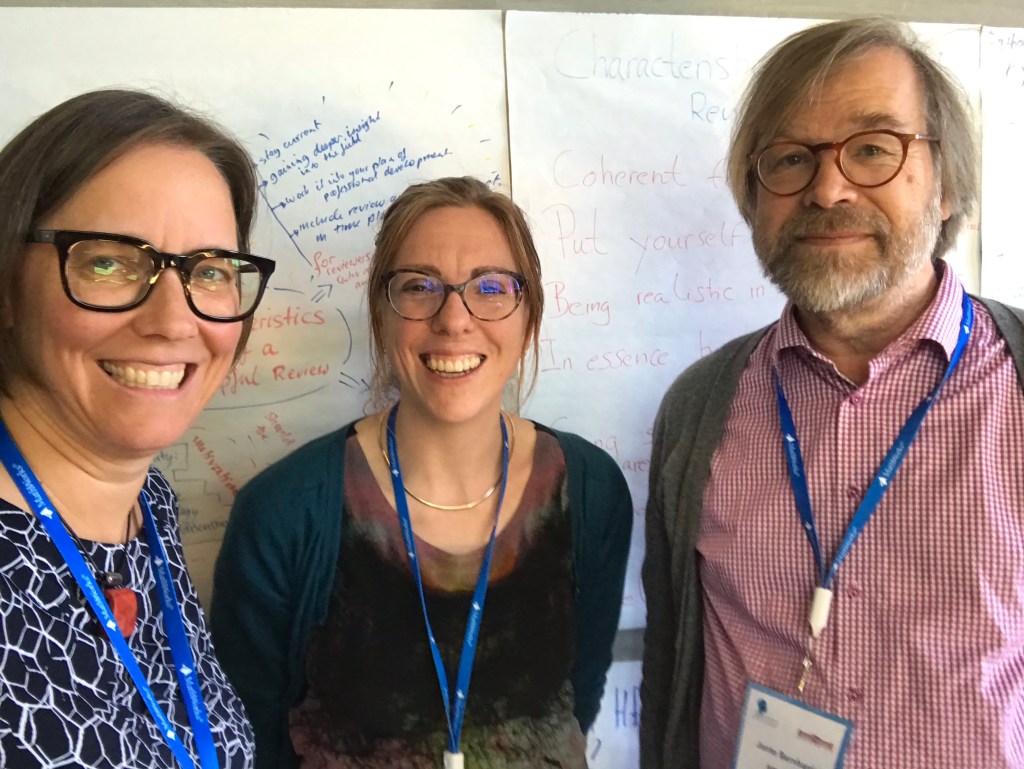
Leading a workshop with the Deputy Editors of EJEE at SEFI 2018 in Budapest. 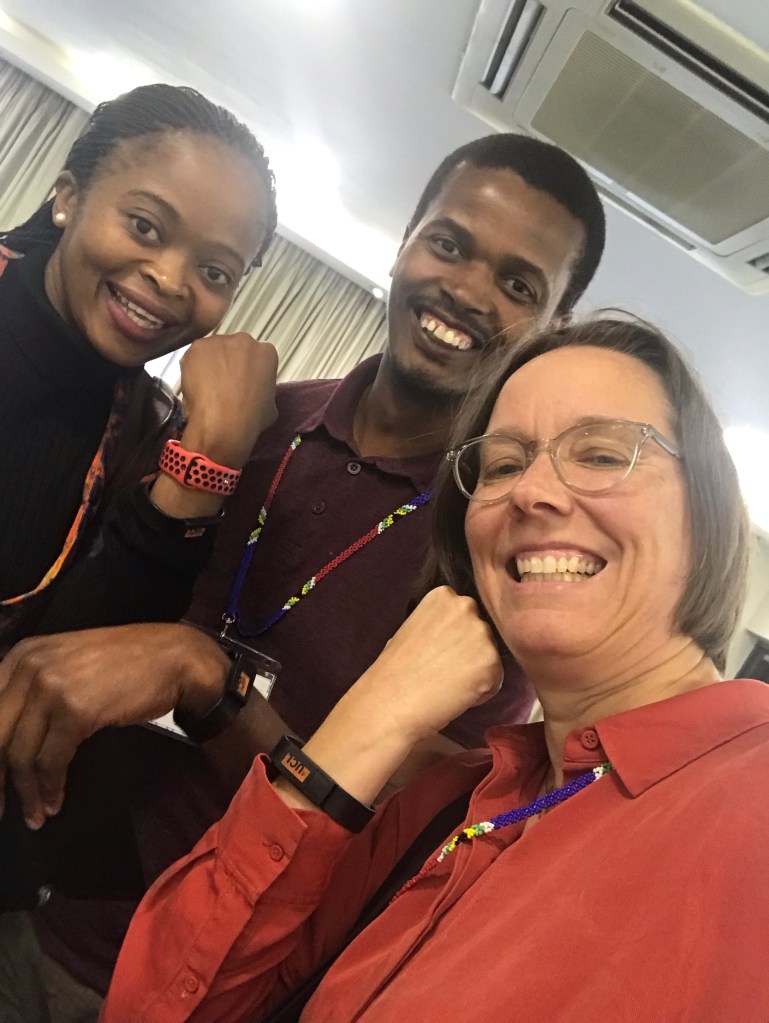
Meeting newer researchers at REES 2019 in Cape Town. 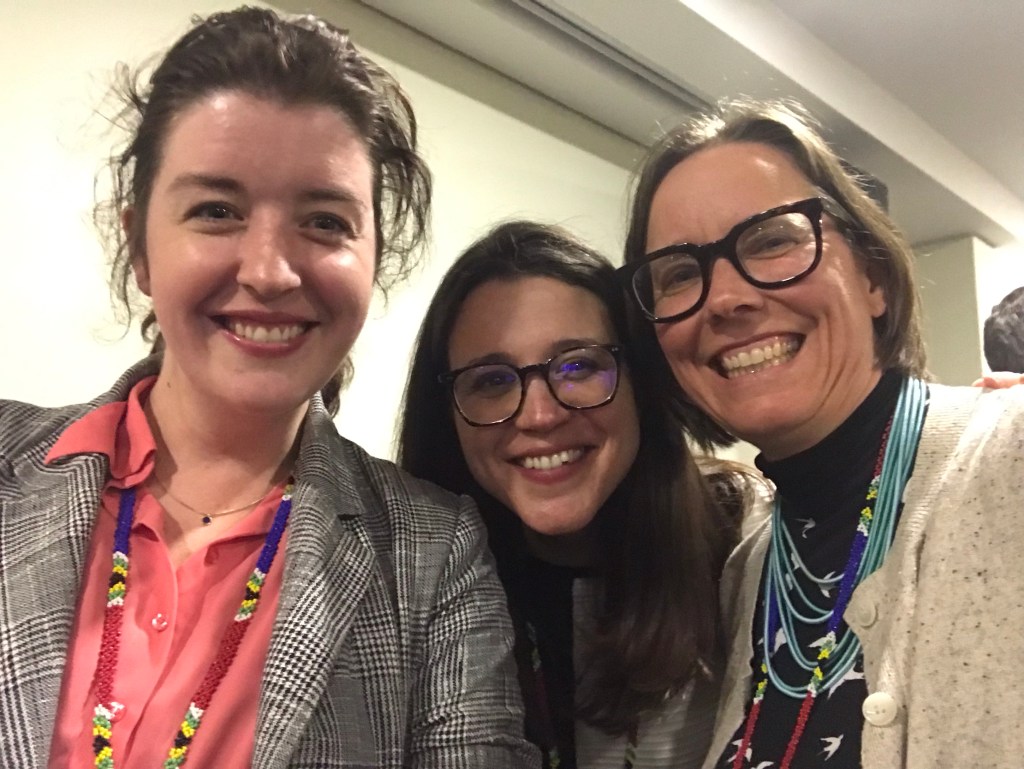
Chatting with a colleague from EWB-UK.
WP2, Multiple Methods in Research
I also shifted the intention of WP2 slightly after getting the Fellowship underway. I focused my efforts on “multiple methodologies” in engineering education research rather than solely “mixed methods” as originally proposed. This shift in definition allowed me to learn a wider range of research techniques. For instance, changes to WP2 allowed study of the psychological construct of grit.
Learning to work collaboratively as part of a highly effective research team was a major outcome of this fellowship. Another shift in WP2 was that, while I originally anticipated developing and conducting my own survey to extend WP1, I was able to learn more by working with psychologist Dr. Inês Direito to design and implement a quantitative survey for use at UCL. That study was presented/published via the Research in Engineering Education Symposium (REES) in Cape Town in July 2019.
Many researchers use a single methodology, or a highly focused set of similar methodologies, to answer their questions. Thus, they tend to ask questions that can be answered with the methodologies they know. As this particular MSCA Fellow aims to conduct research projects that address a wide array of research questions, I need to develop mastery of many different methods. This way, I can use the most appropriate research method for answering each type of question when it arises. Therefore, the intention of WP2 was to build my skills in new methodologies, and also to help build the skills of the larger engineering education research (EER) community by infusing knowledge about these methodologies.
In the MSCA grant application, the following deliverables were promised under WP2: submission of one conference paper and one journal manuscript. Under WP2, however, I have already delivered five conference presentations, three published journal articles, four conference presentations, and one encyclopedia entry. In addition, I have two conference manuscripts underway. Details are provided below.
The first major project under WP2 had two focus points: (1) comparing two different methodologies and applying these methodologies to (2) study engineering teachers’ experiences implementing design- and problem-based learning. A major publication resulted:
CHANCE, S. M., Duffy, G., & Bowe, B. (2019). Comparing grounded theory and phenomenology as methods to understand lived experience of engineering educators implementing Problem-Based Learning. European Journal of Engineering Education, DOI: 10.1080/03043797.2019.1607826. (Download here or here).
The content was also delivered at a leading conference:
CHANCE, S. M. & Duffy, G. (2018). A model for spurring organizational change based on faculty experiences working together to implement Problem-Based Learning. American Society for Engineering Education (ASEE) conference in Salt Lake City, Utah. (Download here, here, or here).
The above publications are part of a larger effort by this Fellow to support diverse students. As a result of this MSCA, I have emerged as a highly visible member and leader of the EER community globally. As part of this community, I am trying to develop better teaching practices (androgies, or pedagogies for adults). To support this effort, I co-authored an overview on socio-cultural diversity in engineering education that was published in a leading journal:
CHANCE, S., Bottomly, L., Panetta, K., & Williams, B. (Eds.). (November 2018). Guest Editorial Statement for the Special Issue on Increasing the Socio-Cultural Diversity of Electrical and Computer Engineering and Related Fields. IEEE Transactions on Education, (61)4, 261-264. DOI 10.1109/TE.2018.2871656. (Download here).
Work conducted via WP2 also helped inform an encyclopedia entry I authored:
CHANCE, S. M. (2020). Problem-Based Learning: Use in Engineering Disciplines. In Amey, M. J. & David, M. E. (Eds.). The SAGE Encyclopedia of Higher Education, 5v. Thousand Oaks, CA: Sage.
Under WP2, I also interviewed 20 women studying engineering in Ireland. This added to the set of interviews I had previously conducted, and it is allowing me to produce longitudinal studies on women’s experiences learning engineering and working in engineering teams. Data analyzed to date focus on the experiences of: (a) a single mother studying engineering and overcoming challenges and (b) Middle Eastern women studying engineering in Ireland. In the future, journal articles will be prepared, related to both topics. Already-published work on this project includes one conference publication on the single mother:
Williams, B., CHANCE, S. M., & Direito, I. (2019). No one really minded a female barmaid, but I don’t know they’d “not mind” a female engineer: One student’s journey. UK-Ireland Engineering Education Research Network 2019 conference in Coventry, UK. (Download here).
Already-published work on this project also includes multiple conference papers about Middle Eastern students’ experiences:
CHANCE, S. M., & Williams, B. (forthcoming). Here you have to be mixing: Collaborative learning on an engineering program in Ireland as experienced by a group of Middle Eastern young women. EDUCON2020 – IEEE Global Engineering Education Conference in Porto, Portugal.
CHANCE, S. M. & Williams, W. (2018). Preliminary findings of a phenomenological study of Middle Eastern women’s experiences studying engineering in Ireland. American Society for Engineering Education (ASEE) conference in Salt Lake City, Utah. (Download here or here).
An additional report of the Middle Eastern students’ experiences was also presented at the following conference but was inadvertently omitted from the proceedings:
CHANCE, S. M. & Williams, W. (2018). Middle Eastern Women’s Experiences of Collaborative Learning in Engineering in Ireland. International Conference on Interactive Collaborative Learning (ICL) in Kos Island, Greece. (Download here).
In a similar vein to the study on Middle Eastern women studying in Ireland, an additional conference paper has been drafted that relates to people studying engineering abroad:
Direito, I., Williams, W., & CHANCE, S. M. (under development). Brexit impact: Perspectives of Portuguese students and staff in the UK. The 4th International Conference of the Portuguese Society for Engineering Education (CISPEE 2020) in Lisbon, Portugal. (This one we shifted to SEFI 2020 since COVID postponed the CISPEE conference.)
At the start of this MSCA, I and my colleague at UCL decided they also wanted to learn to conduct systematic literature reviews. They published individual studies using this methodology at the Societe Europeenne pour la Formation des Ingenieurs (SEFI) conference in 2018, and they joined with a third colleague they met there to later conduct workshops on the topic and publish a journal article collaboratively. The citation below is for our initial conference paper:
CHANCE, S., & Direito, I. (2018, October). Identification and preliminary review of doctoral theses in engineering education that have used phenomenological methods. In Proceedings of the 46th SEFI Annual Conference 2018. Creativity, innovation and entrepreneurship for engineering education excellence. Societe Europeenne pour la Formation des Ingenieurs (SEFI). Copenhagen, Denmark. (Download here).
After joining together, the team selected one of the initial conference papers and developed it into a journal article on the construct of grit and how it has been studied in engineering education.
Direito, I., CHANCE, S. M., & Malik, M. (2019). The study of grit in engineering education research: A systematic literature review. European Journal of Engineering Education. DOI: 10.1080/03043797.2019.1688256. (Download here).
My colleagues and I were able to study and critically evaluate how grit has been researched and reported in engineering education and formulate recommendations to guide others reporting work on grit in EER. This was one of the studies where my colleagues and I were practicing the research methodology known as “systematic literature review” which lead to multiple conference papers as well as the journal article listed above.
Direito, I., CHANCE, S., Tilley, E., & Mitchell, J. (2019, July). Assessing the grit and mindset of incoming engineering students with an emphasis on gender. In Proceedings of the 8th Research in Engineering Education Symposium (REES 2019) (Vol. 8, pp. 253-261). REEN (Research in Engineering Education Network) and SASEE (South African Society for Engineering Education). (Download here or here).
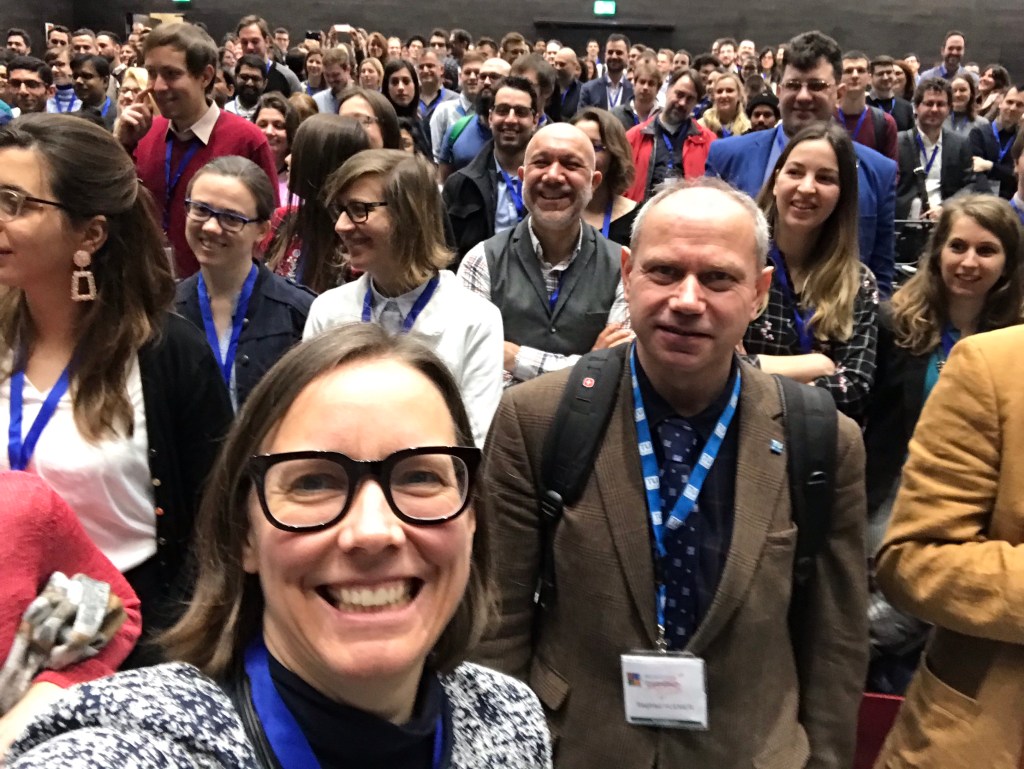
Attending the MCAA General Assembly in Vienna. 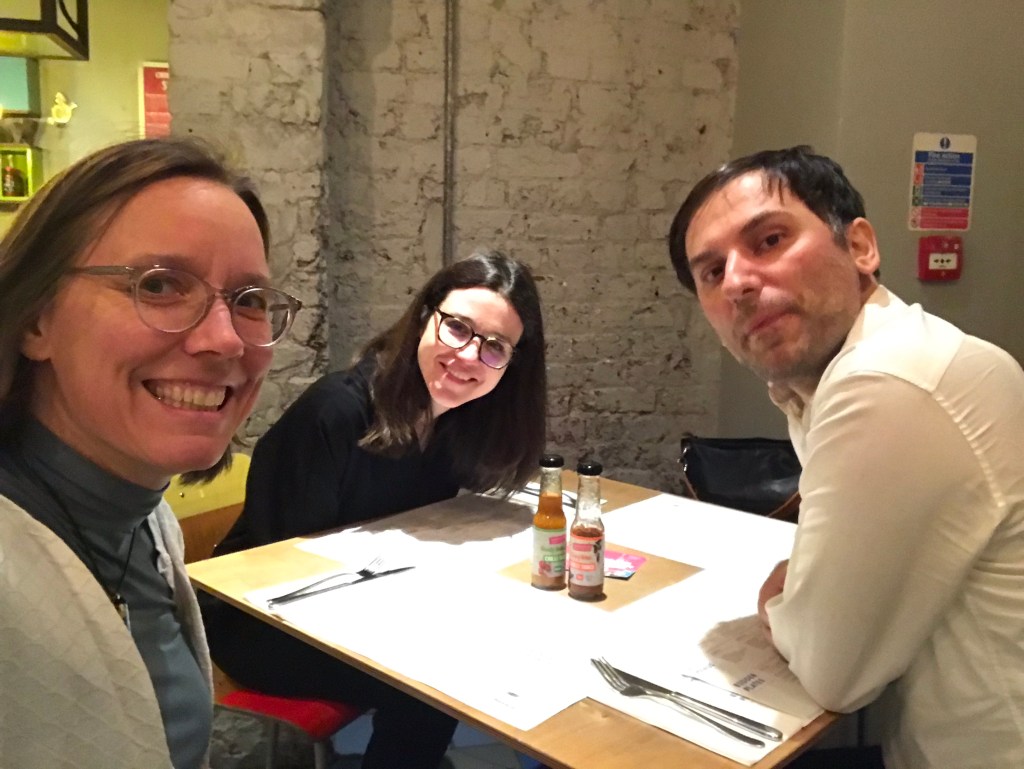
Work session with Inês Direito and Mike Miminiris at SEFI in Budapest. 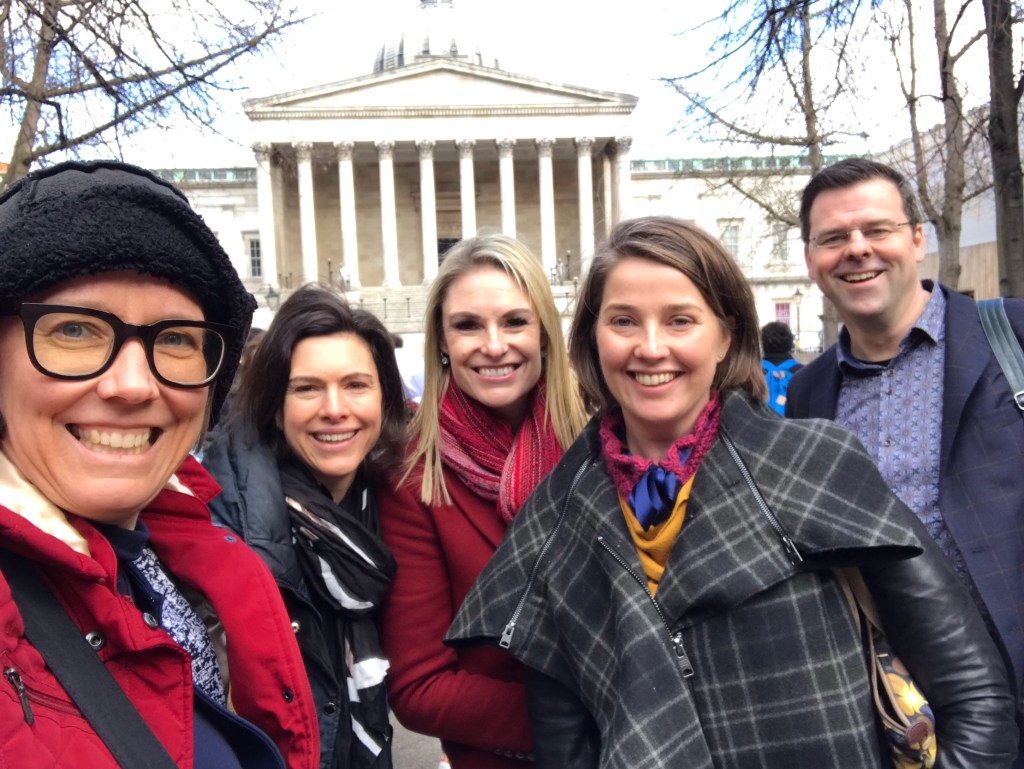
Hosting colleagues from TU Dublin, my home institution, visiting UCL.
[…] Doing social science as an MSCA Research Fellow […]
LikeLike